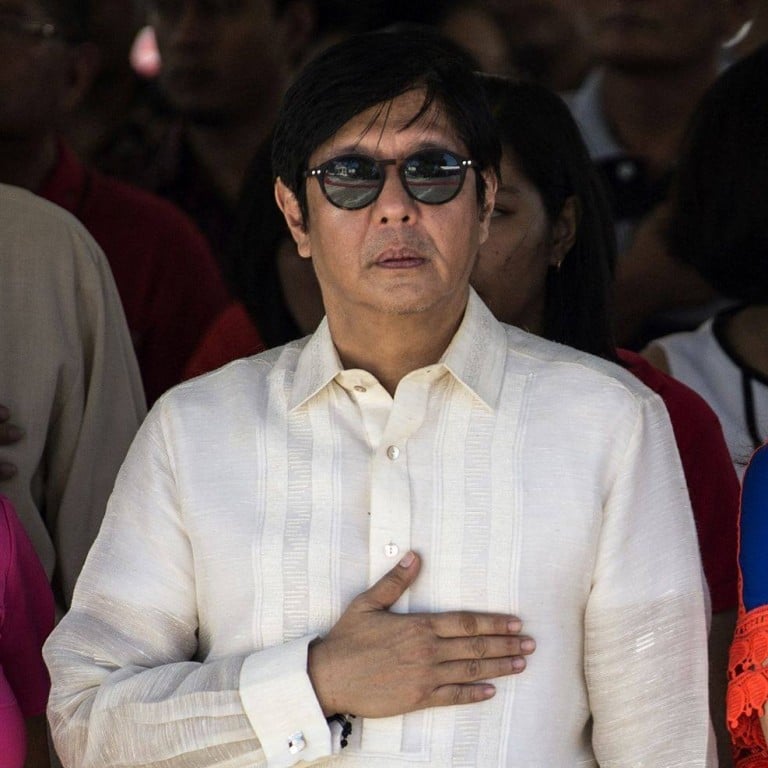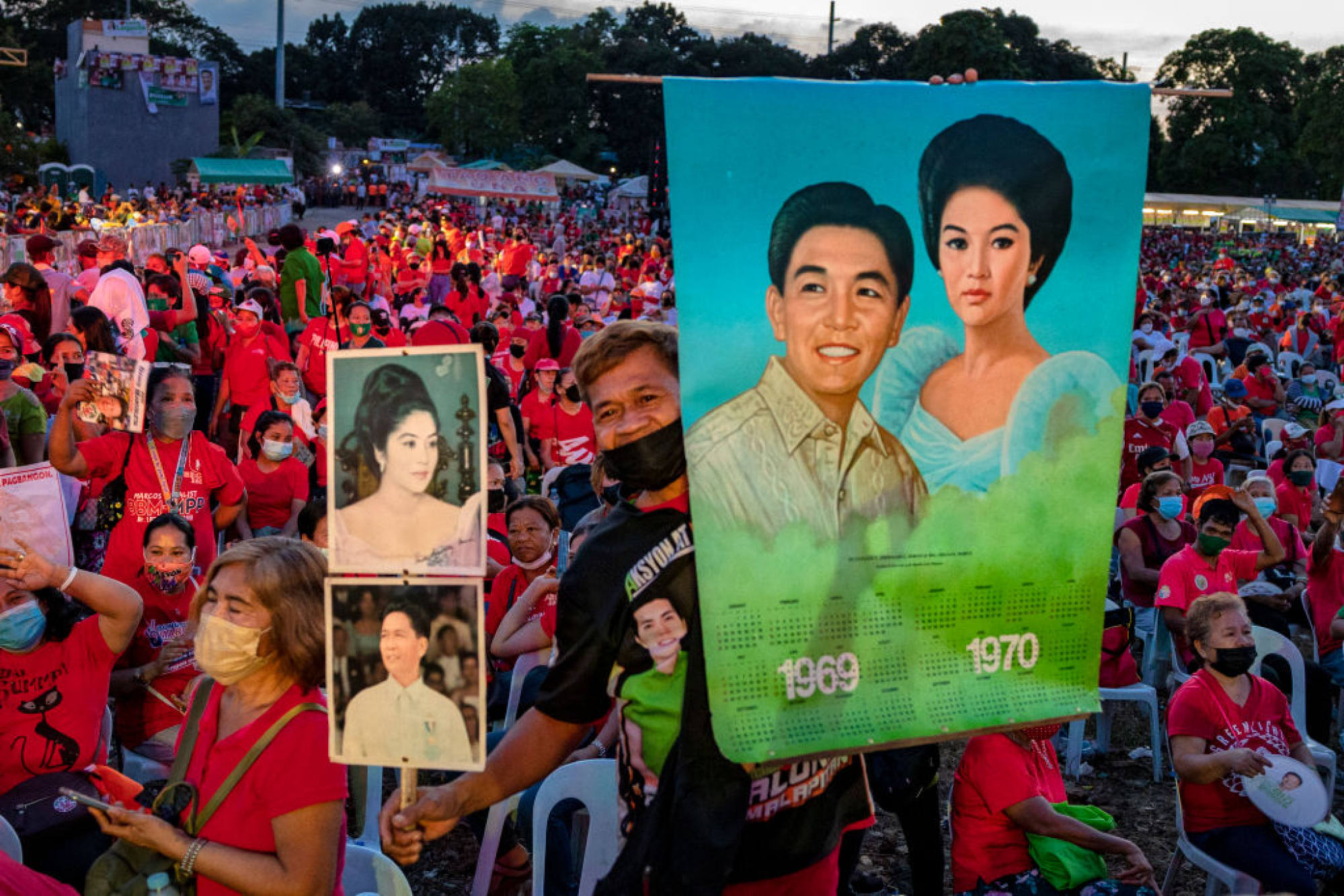
Philippines’ Marcos Jnr will take presidential oath at venue linked to father’s brutal legacy
- The former Philippine Congress building was once the scene of violent protests by student activists who accused Marcos Snr of cheating his way to a second term in 1969
- Playwright Bonifacio Ilagan, who participated in student protests and was jailed during Marcos Snr’s dictatorship, says he continues to be labelled as an agitator out ‘to embarrass’ son Marcos Jnr
At noon on Thursday, Ferdinand “Bongbong” Marcos Jnr will take his presidential oath on the steps of the Philippines’ former legislature, where his late father-president was once confronted by student activists with a black paper-mache coffin and a crocodile.
His inauguration as the nation’s 17th president will be “very solemn and simple”, event organisers said. “We will not stray from tradition,” Marcos Jnr said.
Historian Ambeth Ocampo surmised that the venue – the National Museum of Fine Arts building which used to house the Philippine Congress until Marcos Snr shut it down in 1972 – was chosen for its “optics”. Its American colonial-style period columns mimic the backdrop for the inauguration of US presidents who take their oath on the steps of the Capitol.
Whoever picked the venue did not know Philippine history, said Ocampo, a former head of the National Historical Commission, on Sunday.
First, Ocampo said, all three presidents who took their oaths there – Manuel Quezon, Jose Laurel and Manuel Roxas – not only failed to finish their term, two of them – Quezon and Roxas – died while in office.
Second, “that is where the First Quarter Storm began”, said Ocampo, referring to the series of increasingly violent student protests following the 1969 election, in which Marcos Snr was accused of having cheated to win a second term.
What does a Marcos Jnr presidency mean for Asean and democracy in the region?
Playwright Bonifacio Ilagan, 70, intends to spend inauguration day protesting Marcos Jnr’s assumption to the presidency, in the same way he protested against his father 52 years ago when Marcos Snr delivered his State of the Nation Address on January 26, 1970, in the same building.
He said on Monday: “I don’t know if Marcos Jnr realises that the venue was a historic site for student unrest and radicalisation.”
Ilagan, who was jailed and tortured during Marcos Snr’s dictatorship, is the convenor of The Campaign Against the Return of the Marcoses and Martial Law (CARMMA).
Authorities have branded Ilagan and his ilk as agitators out “to embarrass” Marcos Jnr. “Ultimately, all they want is to overthrow the government through violent means to be followed by a socialist revolution,” Jonathan Malaya, the outgoing spokesman of the Department of Interior and Local Governments, has said.

Just as Marcos Snr was guarded in 1970 by thousands of soldiers when he delivered his state address inside the same building, a combined force of more than 15,000 soldiers and policemen will secure the same venue on Thursday, since it is a 20-minute walk from Liwasang Bonifacio freedom park, where Ilagan and other protesters are allowed to gather.
The playwright said he would continue to protest the fact that Marcos Jnr was “not an innocent bystander” of his father’s crimes against the people. He recalled “the iconic picture of him wearing a fatigue uniform” while his father addressed his loyal supporters from the palace balcony just before the family fled. “Him in an army uniform, showed he was willing to defend his father who cheated” in the 1986 elections, he said.
Ilagan pointed out that Marcos Jnr was also the “chief administrator” of the Marcos estate, which consists of the “accumulated stolen wealth” of his parents, and his campaign song, The New Society, was about his father’s brutal dictatorship, during which Ilagan’s sister was also snatched by the military and never found.
Confessions of a dictator’s son: Philippines’ Marcos ‘ran for his parents’
Ilagan traced his political “radicalisation” and those of thousands of young activists to the afternoon of January 26, 1970, when as a 17-year-old political science student, he had hesitantly joined a 50,000-strong student protest in front of the same iconic building.
“When I saw the black papier-mâché coffin flying in the air towards Marcos Snr, followed by a crocodile, and Marcos Snr’s effigy burning, my first reaction was to retreat to safer ground,” he recalled.
Coincidentally, trouble had started when two student leaders began wrestling over who should get the microphone to speak to the restless crowd. When the Metropolitan Command – a special military unit created by Marcos Snr to quell unrest in the nation’s capital – started breaking up the crowd, pebbles from a nearby golf course started flying.
“I saw the Metrocom beat up students already lying on the street with their rattan sticks. I saw a woman trip and fall,” Ilagan said. As he ran to her to help her up, a member of the Metrocom landed a glancing blow on his arm, which immediately swelled.
“I became furious. I was doing nothing wrong. That was the beginning of my radicalisation like the many who were there,” Ilagan recounted.

Unknown then to Filipinos, Marcos Snr claimed the protesters’ First Quarter Storm had convinced him he was in danger of being ousted. In his secret diary – which he accidentally left behind in the presidential palace bedroom when he fled – he recorded the melee that took place as he emerged from the legislative building.
He recalled the coffin and alligator flying, “then the wood, bottle and stone throwing which caught us at the front stairs. I could not go into the car as (his wife) Imelda kept standing on the stairs”. He recalled pulling and shoving her “into the car floor much too hard”.
The next day, he wrote, “the pattern of subversion is slowly emerging. The danger is now apparent to me but not to most people”. He then concluded that “If I want to be perpetuated in power” the easiest way was to amend the constitution.
Half a century later, his son ran and won with the promise to change the constitution.

